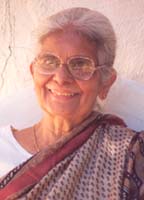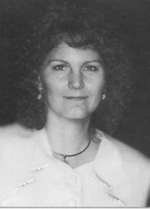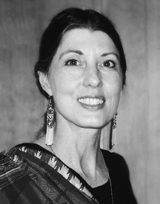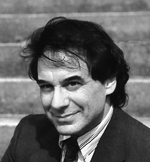The Love of God: What If?
By Richard Darnell
Originally printed in the MAY - JUNE 2007 issue of Quest magazine.
Citation: Darnell, Richard. "The Love of God: What If?" Quest 95.3 (MAY-JUNE 2007): 108-109.
What if God's vocabulary had only one word in it and that word was "Love"? God has loved us from the beginning, to this day, and for all time to come. There will never be a time in human history, no matter how dark and desperate life may become, that God will not love us all unconditionally. To me, the words God and Love are the same. The power of one is seated in the power of the other. God is Love, and Love is God. I can see no difference.
Every person who has lived, and who will pass through life on this earth, is on the most sacred of all journeys. At our birth, we came from God's embrace; upon our passing from this earth, we will return to it. The journey we take on earth between God's embraces is truly between God and ourselves. No other person can judge us or that journey. Jesus said, "Let those among you who have no sin be the first to cast a stone." Judge not, judge no other.
We are all here on this earth to live our lives as we choose. However, being human, we make mistakes nearly every day. At times, these mistakes are burdens that appear to be beyond our strength to carry. With faith and over time, we endure every burden which we have placed upon ourselves.
These mistakes are truly lessons from which we can learn. What some call sins, others view as lessons in life. The hatred and violence in this world demand a label befitting their character and the label of "sin" covers many of these deeds, both great and small. What they have in common is that they are lessons to be learned by everyone. Could it be there are no sins, only lessons to be learned? From every event, good or bad, that takes place around us, we may learn something. These mistakes, ranging from minor transgressions to the extinction of entire races, teach lessons to all who take part in that event, victims and perpetrators, alike. People learn from us through our actions, both personal and public.
When the first humans walked this earth, they each possessed a unique gift from God; the gift of a soul. Within that soul lives God, the Creator of all; The Kingdom of Heaven, and what can be called the Light of Christ. If there is only one word in God's vocabulary, Love, we may ask the question: What about all the other words we use in our daily lives? Does God need to use a few more words than just Love to guide us here on earth? God has given us all we need to live our lives between divine embraces. We are made in God's image. The gift of our soul comes directly from God's essence. God is as much a part of us as the air we breathe. When you gaze into another's eyes, it is God you see looking back at you.
We are responsible for every action we take or fail to take, and for every step we make, just as we are responsible for every thought and desire we create in our hearts. People often ask God or God's Son to forgive them their many sins or lessons in life. You will never be forgiven by God for anything you have done on this earth. The word forgiveness is not in God's vocabulary, only love. God has no need to forgive God. We need to take responsibility for all our actions and forgive ourselves for what we have done to others and to ourselves here on earth. God loves us unconditionally; there are no hoops to jump through or special words to recite. God simply wants to hold us all in an eternal, divine embrace.
Many fear for their eternal salvation. Will their soul be tossed carelessly into the pit of eternal fire and damnation? Your soul has never been in danger of eternal fire of damnation, nor will it ever be. How can God's gift to you be doomed to spend all of eternity separated from God?
No one can stand between you and God, and your sacred journey back to that divine embrace. One curious component of human behavior is the inflatable ego, one size fits all. We have all heard such phrases as: "We are the chosen," or "only those who believe as we do are worthy," and so on. These ego-driven, self-centered comments demonstrate how enormously the human ego can be inflated, and always at the cost of the self-worth of others. Though many try using their positions in life or their rank in organizations to condemn others for their sins, we need only remember this: judge not.
You may ask: "How should I live my life on my journey back to God's embrace?" Allow the love of God in your soul to live in your daily life. Bless all who cross your path on their own sacred journey. In short, be as God and love unconditionally.
To live in the shadow of earthly fears is part of everyday life for many. The paths we choose on our journey lead us to interact on many different levels with others, pursuing their own paths. Ideally, these interactions can be deeply loving and nurturing relationships that last a lifetime. For many of us, however, our interactions with others are sometimes far from ideal. A good part of our lives can be spent surviving relationships with others that bring us to our knees or lower.
Many have asked where God is in all of this. God is, and has always been, with us, letting us make our own decisions in life and then letting us live with the consequences. God has helped many on their journeys by answering their prayers in accordance with divine timing and in God's own fashion. And even as life comes to an end here on earth, which must inevitably happen to each of us, God will be there, as always, with unconditionally loving arms gathering us back into the bosom of the Divine.
Each day we live brings us closer to our reunion with God. Until that day, hour, and minute arrive, we are blessed with a choice. We can make our lives a loving, joyous, adventure or a disastrous spiral into the mud of life. Most of us will probably fall somewhere between, but it is never too late to start. Today is the first day of the rest of your life; to live it in the mud or in joy is your choice.
How important is time in our journey back to God's embrace? Ultimately, the time which has already passed and the future, which has yet to be, are of little importance. Both past and future have their place in our lives, of course, but neither is as important as the present time.
The present moment is the time you live in as you read this statement. It can be said that present time is all the time there is. Perhaps, then, we need to live our lives in the present instead of regretting past actions and dreaming of future events that may never transpire. Reach out this moment and touch what is at hand, before it becomes the past.
How are we to understand the living God? Can a finite mind ever truly comprehend an infinite being? Perhaps it is enough to recognize that God is not out there, around the corner or billions of light years away. The living God is within all of us. Try standing in front of a full-length mirror and look at your feet. Then slowly follow your body up to your eyes. Once you understand the person whose eyes you are looking into, all your questions about God will have been answered. For many, this is a lifelong task; others do not accomplish it before they pass on. What about the person who has left this world; what of their soul? We all know what happens physically, but that leaves open the eternal question of life after death.
Our answer lies in the assurance that God loves us all unconditionally. Watching over all, God's gift to us is what we want most: to live a life on earth and to return to our Source as better loving souls. We come from God in heaven, live our lives here on earth, and return to God in heaven. What can surpass the joy of living a life here on earth and then returning to God's embrace?


 Much is said about the new millennium and the new century nowadays, but humanity is stubbornly persisting in its old ways. How can the millennium be new when the human mind is entrenched in old patterns? What will be new? Improved models of gadgets? Cloned monsters? Every such thing will be the product of stale minds filled with prejudices and ambitions. Human consciousness must break with the past in order to usher in a new dawn. It must obtain a new view of life, a new vision. Madame Blavatsky wrote in her article on "What Are the Theosophists?" published in the first volume of the Theosophist magazine (CW 2:98-106):
Much is said about the new millennium and the new century nowadays, but humanity is stubbornly persisting in its old ways. How can the millennium be new when the human mind is entrenched in old patterns? What will be new? Improved models of gadgets? Cloned monsters? Every such thing will be the product of stale minds filled with prejudices and ambitions. Human consciousness must break with the past in order to usher in a new dawn. It must obtain a new view of life, a new vision. Madame Blavatsky wrote in her article on "What Are the Theosophists?" published in the first volume of the Theosophist magazine (CW 2:98-106): Helena Petrovna Blavatsky, the main idea-person and one of the principal founders of the Theosophical Society, is often criticized because she was not known as an ascetic or model of spiritual purity. Yet the Mahatmas themselves tell us that she was "the best available" to create a bridge between East and West although they had searched for a hundred years to find a suitable person. From this information, we conclude that her personality flaws are what make her less than ideal as the leading spokesperson for the Theosophical Society. In that conclusion, I wonder, however, "Are we missing the point?"
Helena Petrovna Blavatsky, the main idea-person and one of the principal founders of the Theosophical Society, is often criticized because she was not known as an ascetic or model of spiritual purity. Yet the Mahatmas themselves tell us that she was "the best available" to create a bridge between East and West although they had searched for a hundred years to find a suitable person. From this information, we conclude that her personality flaws are what make her less than ideal as the leading spokesperson for the Theosophical Society. In that conclusion, I wonder, however, "Are we missing the point?" Excitement filled the air when more than 500 members from 39 different countries attended the Ninth World Congress of the Theosophical Society, held in Sydney, Australia, January 11 -18, 2001. Long-time friends and new ones among the many cultures represented at the Congress forged the bonds of brotherhood that cross all cultural boundaries. All were struck by our similarities, interest in the same studies, and concerns over the same issues.
Excitement filled the air when more than 500 members from 39 different countries attended the Ninth World Congress of the Theosophical Society, held in Sydney, Australia, January 11 -18, 2001. Long-time friends and new ones among the many cultures represented at the Congress forged the bonds of brotherhood that cross all cultural boundaries. All were struck by our similarities, interest in the same studies, and concerns over the same issues. I am walking like Bugs Bunny walked when he walked behind Elmer Fudd, mimicking Fudd's hunting him. I am doing this amidst a dozen strangers outside a classroom of the Krotona Institute, high on a hill overlooking southern California's Ojai valley. I'm in my stocking feet, and one foot goes down very deliberately to a silent chord of three seconds while the other balances precariously in the air. It doesn't matter how funny I look with my Fudd-Bunny impersonation because each of my classmates is equally intent upon their own deliberate gait and posture. It's a focusing exercise; and when I don't feel like Bunny, I feel like a Cherokee, imagining my moccasins ever so gently touching the earth. I think I can feel the wobble of the earth and I seem to hear the song it sings in the hot dry breath of the cypresses undulating like waves to the Topa Topa ranges.
I am walking like Bugs Bunny walked when he walked behind Elmer Fudd, mimicking Fudd's hunting him. I am doing this amidst a dozen strangers outside a classroom of the Krotona Institute, high on a hill overlooking southern California's Ojai valley. I'm in my stocking feet, and one foot goes down very deliberately to a silent chord of three seconds while the other balances precariously in the air. It doesn't matter how funny I look with my Fudd-Bunny impersonation because each of my classmates is equally intent upon their own deliberate gait and posture. It's a focusing exercise; and when I don't feel like Bunny, I feel like a Cherokee, imagining my moccasins ever so gently touching the earth. I think I can feel the wobble of the earth and I seem to hear the song it sings in the hot dry breath of the cypresses undulating like waves to the Topa Topa ranges.